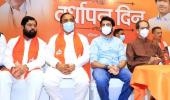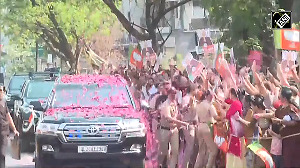Former Lok Sabha Speaker Manohar Joshi, who was Shiv Sena's suave face at a time when the party was known for its rustic and street politics, passed away at a Mumbai hospital on Friday.

The 86-year-old former Maharashtra chief minister was admitted in the Intensive Care Unit (ICU) of P D Hinduja Hospital on February 21 after suffering a cardiac arrest.
His last rites were performed with full state honours in the presence of former chief ministers Sharad Pawar, Sushilkumar Shinde and Uddhav Thackeray.
He was admitted in the hospital in May last year after suffering a brain haemorrhage.
Condoling his death, Prime Minister Narendra Modi said Joshi was a veteran leader who spent years in public service and held various responsibilities at the municipal, state and national level.
As Maharashtra CM, he worked tirelessly for the state's progress and also made noteworthy contributions as a Union minister, the PM said.
During his tenure as the Lok Sabha Speaker, he strove to make parliamentary processes more vibrant and participative, the PM said.
'Manohar Joshi Ji will also be remembered for his diligence as a legislator, having had the honour of serving in all four legislatures. Condolences to his family and supporters. Om Shanti,' Modi said.
Union minister Nitin Gadkari, who was a member of the Maharashtra ministry when Joshi was the CM, said the state had lost a cultured face of politics.
Chief Minister Eknath Shinde said Joshi's political journey from councillor to Lok Sabha Speaker will serve as an inspiration to future generations.
Joshi Sir, as he was popularly known, was the first chief minister of the undivided Shiv Sena and held the post during 1995-1999.
He was also elected as a member of Parliament and was the Lok Sabha Speaker from 2002 to 2004 when the Vajpayee government was in power.
Born on December 2, 1937 in coastal Konkan region of Maharashtra, Joshi obtained his Bachelor's degree in Civil Engineering from the prestigious Veermata Jijabai Technological Institute (VJTI) in Mumbai.
His political career began with his involvement in the Rashtriya Swayamsevak Sangh and he later became a member of the Shiv Sena. In the 1980s, Joshi emerged as a key leader in the Shiv Sena, and was known for his organisational skills.
Joshi was a teacher before entering politics in 1967. He was associated with the Shiv Sena for more than four decades.
He was a municipal councillor in Mumbai during 1968-70 and chairman of the civic body's Standing Committee in 1970.
He was the Mayor of Mumbai during 1976-1977.
Joshi was then elected to the Maharashtra Legislative Council in 1972.
After serving three terms in the Legislative Council, Joshi was elected to the Maharashtra Legislative Assembly in 1990 and was the Leader of the Opposition in the assembly during 1990-91.
In the 1999 general elections, Joshi won from the Mumbai North-Central Lok Sabha Constituency as a Shiv Sena candidate, and was later Union minister of Heavy Industries and Public Enterprise.
He was married to Anagha Joshi, who died in 2020 at the age of 75. He is survived by a son and two daughters.











 © 2025
© 2025